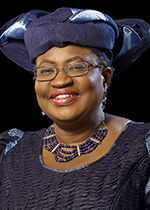H.E. Ngozi Okonjo-Iweala
Dr. Ngozi Okonjo-Iweala is a Senior Advisor at Lazard and Chair of the Global Alliance for Vaccines and Immunization. She was previously the Minister of Finance in Nigeria and Co-ordinating Minister for the Economy (August 2011 to May 2015). She is chair and member of numerous boards and high-level global development initiatives including the International Commission on Financing Global Education Opportunity, the UNSG’s Post 2015 MDGs High Level Panel and the Post-Busan Global Partnership for Development Effectiveness. She was educated at Harvard University and holds a PhD from the Massachusetts Institute of Technology.
Reflections
Q: You have been an important international advocate for institution building and governance reform in Africa. What drives your passion for the subject?
A: Africa’s natural and people resources are boundless, which if properly nurtured can lead to great prosperity. Institutions involved in collecting, managing and overseeing public financial resources are essential to the achievement of the African dream and must be appropriately empowered to ensure discipline, predictability of the policy environment and public accountability.
Building strong institutions, processes and systems takes time and efforts are bearing fruit. However, I strongly believe that this is the only way to build public confidence and address societal challenges such as corruption, rising inequalities, serious youth unemployment and lack of infrastructure that hold development back.
My journey as a proponent of governance and institutional reform in Africa is deeply rooted in Africa’s inspiring transformational story since the turn of the century. The 80s and 90s were lost decades for Africa. As a result, with the advent of political and economic reforms in the 2000s, many African nations saw a reversal of negative per capita growth to robust growth averaging over 5% of GDP with sound management of macro-economic policy frameworks, such stabilisation of interest rates, inflation and debt levels, combined with debt relief. This led to increasing confidence in Africa with increasing inflows of Foreign Direct Investment and attractive investment opportunities. However, Africa needs to work hard to maintain this confidence in light of recent challenges of slow growth and rising debt levels.
Additionally, major international stakeholders, both private companies and state-led enterprises, have heavily invested in Africa, some exploiting vast African resources and markets. Nevertheless, there is hope. The information and communication technology revolution, a vast African population, mainly comprising youth, are now increasingly capable of orchestrating demands for their rights to a better life through better governance. They deserve a chance at achieving their dreams. This is what gives me strength to arise every morning.
Q: What issues must Africa overcome in order to marshal adequate resources domestically for development?
A: We do not collect enough taxes in Africa. According to the World Bank, the average tax-to-GDP ratio in 2013 for sub-Saharan Africa was just 15.8%. Aid is a diminishing factor and more focus on domestic resource mobilisation is becoming central to most African governments. With low tax-to-GDP ratios and high debt-servicing obligations, most countries are still unable to mobilise enough resources to finance development. High dependence on commodities is a major issue and hence importance of diversifying their economies to weather economic shocks from falling commodity prices. Improving tax policy and administration is also a critical part of the revenue effort.
Government has a role to boost trust and accountability of institutions handling public resources and demonstrate prudent fiscal management. Lack of trust leads to an even deeper spiral of deprivation as people shy away from providing resources for government to spend. A very strong nexus exists between responsible tax and government spending and clear benefits.
Q: What would success look like for TIWB in addressing these issues? What do you see as a future for TIWB?
A: Tax Inspectors Without Borders has made commendable efforts in the past two years, including its increased focus on South-South co-operation, towards deploying tax audit experts to host tax administrations in Africa and beyond.
The success of TIWB in aiding recovery of USD 414M is a clear indicator that much more can be recovered through sustained TIWB efforts. Billions of dollars of tax due remain outside the reach of most developing countries tax administrations. Developing countries will not be able to deliver on the Sustainable Development Goals without a quantum increase in mobilisation of domestic public resources. TIWB must wholly embrace this task, alongside other development partners.
Secondly, the initiative must continue to play its role as a catalyst to encourage businesses to uphold even higher standards of responsible tax behaviour and avoid the reputational risks associated with aggressive tax planning.
Lastly, it is striking that an initiative with such a high rate of return is still in need of donor funding. Why is this? If we had more support for TIWB, we could deliver so much more revenue. Additionally, expand the Secretariat to support implementation given the exponential growth of programmes. Development partners can do more to successfully scale this initiative and deliver billions of dollars in additional revenue. There is a need to discuss the way forward to capitalise on the good work being done and all future possibilities for building capacity in developing countries.


